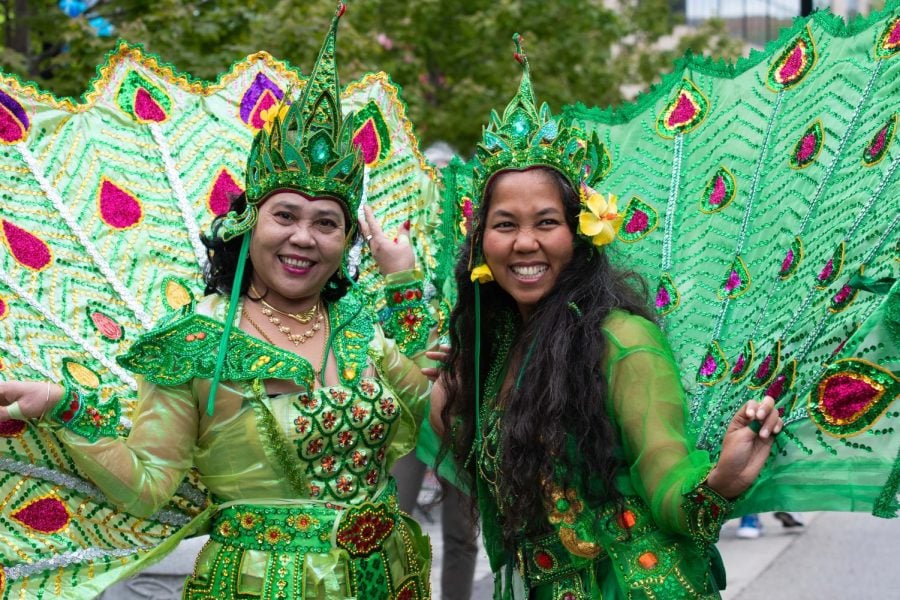Umbrella Arts Festival highlights local artists, celebrates Asian cultures
Ziye Wang/The Daily Northwestern
Two dancers from the group Burmese Peacock International. This year’s event featured artists representing various mediums and Asian cultures.
May 14, 2023
Weekend mornings at Fountain Square are usually quiet, but Saturday was an exception. By 10 a.m., dozens of white tents lined the block from Davis Street to Grove Street with vendors busy setting up their booths for the third annual Umbrella Arts Festival, a celebration of Asian art, performance, food and crafts.
Overcast weather did not deter hundreds of community members from streaming into the event, which was hosted by the Evanston Asian, South Asian Pacific Islander Americans.
Melissa Raman Molitor, the founder of Evanston ASPA, said she first organized the festival in May 2021, at the height of the COVID-19 pandemic and anti-Asian violence across the country.
“We recognized that there really wasn’t any structure in place, support (and) services for the Asian American community here, and really it’s due to the lack of visibility and representation,” Molitor said. “So we decided that we would do a little festival … and it’s grown every year since.”
The festival’s name came from the idea that an umbrella can encompass all Asian cultures, she added.
This year’s event featured artists representing various mediums and Asian cultures. While some showcased their artistry and crafts at their booths, others took to the stage at the center of the block to perform songs and dances.
Shalaka Kulkarni, an independent artist representing the organization Mandala Arts, performed the Indian classical dance Bharatanatyam to music from speakers and a beat set by bells she wore on her ankle. While the music drew the audience into the dance, she said the bells help her keep her rhythm.
Kulkarni said she hoped her performance gave the audience a peek into the diversity of Indian art and culture.
“Indian art is not all Bollywood. Bollywood is a film industry, and it’s a little bit different from Indian folk dances and Indian classical dances,” Kulkarni said. “I hope (the audience is) curious and, eventually, they understand the difference between other (arts) in the same culture.”
At her booth beside the stage, Mandy Yom displayed two stacks of “Nami’s New Friend,” a children’s book she wrote based on her own experiences as a first-generation South Korean immigrant.
Yom, who moved to the U.S. at age 8, said she did not know how to speak English and struggled to make friends when she first started school. She hopes to share her story with others through the book, especially children who have had similar experiences.
The book’s illustrations, Yom said, are also inspired by her childhood drawings.
“People want to connect to the books that they read, so if you always have books about a certain culture or race or character, it stereotypes them into one facet,” Yom said. “I think that’s doing an injustice for kids that are coming up because they should really see everyone else’s lives and learn about them.”
Several local leaders, including Evanston Mayor Daniel Biss, City Clerk Stephanie Mendoza and Cook County Commissioner Josina Morita, spoke at the festival.
Flanked by signs that read “More Love Less Hate,” “Black Lives Matter” and “Stop Asian Hate,” Morita, the first Asian American woman elected to the Cook County Board of Commissioners, spoke on the importance of building a coalition not just between Asian American communities but also with women, LGBTQ+ people, immigrants and other marginalized groups.
Morita also touted the Teaching Equitable Asian American Community History Act, which requires all Illinois public schools to include a unit of Asian American history in their curriculum starting in the 2022-23 school year.
“We’re really proud of that (legislation) because we believe that the best response to hate is education,” Morita said. “It’s going to be a community effort to continue to tell our stories.”
Molitor added she hopes the festival will bring a sense of belonging to members of Evanston’s ASPA community and help them “see themselves reflected in their community.”
At the same time, she wanted the event to be an opportunity to raise awareness and educate people about the diversity present within Evanston’s ASPA community.
“Art is a way to build community, it’s a universal language and it brings people together,” she said.
Email: [email protected]
Twitter: @caseeey_he
Related Stories:
— ‘Spiritual and radical becoming’: APIDA artists discuss using tattoos to collect stories on skin
— APIDA Book Club returns with graphic novel ‘Shadow Life’
— Evanston Lunar New Year celebration promotes Asian cultures and traditions


